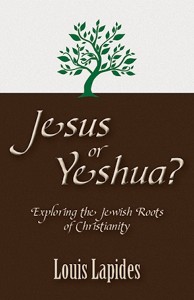Today ScriptureSolutions published a new booklet written by Louis Lapides. This brief book can be found for Kindle at Amazon.
It came to no surprise to me that when I first became a Jewish follower of Yeshua, I was going to have a cultural crisis trying to fit into a Gentile Church. I lasted a few months before I started asking inevitable questions, "I'm Jewish. Jesus is Jewish. His first followers were Jewish. The New Testament was written by Jews and a lot of the concepts they discussed have a powerful Hebraic background. Then why is Christianity so "not-Jewish"?
Jesus or Yeshua: Exploring the Jewish Roots of Christianity provides the reader with some of the findings I came upon as searched for answers to my questions. For me a lot of the issues were resolved when I studied the origin of most of the terminology used by Christians when describing their beliefs and practices. When I was growing up attending Hebrew school in preparation for my Bar Mitzvah I never expected that Rabbi Printz would tell me that the mass practiced by the Catholic Church across the street from our temple was actually based in the Jewish Passover. Nor was I told that baptism has it's origins in the Jewish practice of immersion or mikveh used when Gentiles would turn from their paganism and convert to Judaism.
Attending a church for me at age 23 was a shocker as I describe in my opening chapter. Here is a sample section from that chapter that will give you an idea of what Jesus or Yeshua: Exploring the Jewish Roots of Christianity is all about.
Here’s a shocker . . . Jewish people don’t feel at ease in a Christian church. The first time I attended a Protestant congregation, a Southern Baptist one, I couldn’t avert my eyes from the 10-foot tall stained glass mosaic of Jesus looming behind the pastor. I imagined for a few moments the man from Galilee was about to step out of the window, float over to my pew and ask whether I noticed the “Jews Not Welcome” sign at the church’s front door. “Of course,” I would respond, “But Jesus, aren’t you . . . .?”
Upon further reflection I figured out why I experienced the heebie-jeebies on my initial visit. As a Jewish seeker of truth, I was convinced I was cheating on the God of Israel. Why did worshipping in a Gentile Christian church make me feel like I was unfaithful? Was I cheating on my Bar Mitzvah? Was I betraying Abraham or Moses?
Was it the pastor’s perfectly pressed suit and tie graced by his Southern Baptist grin? It could have been the Sunday morning promise of that evening’s Lord’s Supper that did not turn out to be the smorgasbord I anticipated. I left the service feeling spiritually fulfilled; however, I was famished.
I slowly discovered my discomfort stemmed from the culturally alien environment of a Gentile church. I couldn’t blame them. It wasn’t their fault they were not Jewish. Yet it didn’t feel like I was at Temple Bnai Abraham, the house of worship I attended as a child in Newark, New Jersey.
Each time I entered a church building all I could see were crosses, wall-to-wall beaming Gentiles and hearing the words “Christ” and “Christian” sprinkled into every conversation. I later heard that such church-talk is labeled “Christianeze,” and all Christians learn the lingo quite quickly.
I did not fit. Church did not feel Jewish. The jargon was not Jewish. The terminology caused me to cringe, asking, “What have I gotten myself into?” When the pastor referred to me as a Baptist kid, I knew it was time to delve deeper into this Christian faith that was launched 2000 years ago by courageous Jewish followers of Jesus. I needed to know what happened to a messianic movement started in Israel that now feels more like it was birthed in Nashville, Tennessee (and I happen to love Nashville and its music).
I would love for my readers and friends of ScriptureSolutions to read Jesus or Yeshua: Exploring the Jewish Roots of Christianity and gain from this book what I learned on my safari through Christianity not looking for the "lost ark of the covenant" but simply the "lost Jewish roots" of Christianity. Check out the book and please let me know if it was helpful.

No comments:
Post a Comment